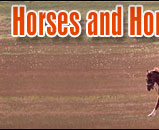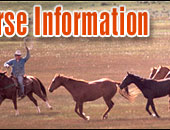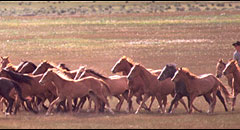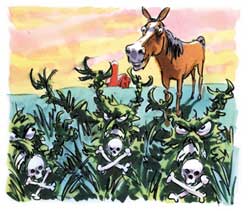 |
   |
|
|
|
You are here: Horses > Horse pasture / forage > Pasture perils |
Stress Prevents Healthy Grazing
If your horse suddenly falls ill with toxic syndromes, the odds are good it has
something to do with the plants it has ingested. Obviously, if you believe that
the animal has grazed on poisonous plants, you will need to notify your
veterinarian immediately.
|
|
|
Make certain that you show the vet where your animal
has been grazing for the last six months, and also
indicate if there has been any change in feed, the
pasture where your horse goes to graze and also
environmental changes.
Generally speaking, horses usually stay away from
poisonous plants that may grow in their pasture and
stick to the healthy forage. Yet if the animals
experience stress – such as it may be caused by a
drought, an overcrowding of the pasture, or even the
introduction of a new herd mate – they may begin grazing
on plants that normally they |
might avoid. Another factor is the well meaning gardener who reserves some
tasty clipping including toxic plants for their horses.
 Here
are some examples of plants to avoid: Here
are some examples of plants to avoid:
- The leaves and bark of the red maple in the summer and fall are toxic for
horses. Signs of ingestion include elevated heart and respiratory rates, urine
that is colored dark red and yellowed mucus membranes.
- Wilted leaves of cherry, plum, peach and apricot trees contain cyanide,
which will result in respiratory distress in horses if ingested.
- The Japanese Yew – an ornamental evergreen shrub – is so toxic that about
a quarter pound of its clippings will kill an adult horse in a quarter hour.
Your horse will appear disoriented, unable to coordinate its gait, suffer from
respiratory distress, and fatal heart stoppage.
- Rhododendron and mountain laurel will induce severe colic and also heart
problems in horses. Four pounds of these leaves may be all it takes to bring
about this reaction.
- The shavings of the black walnut – when used as bedding – causes edema and
founder. The cause is the hardwood; the trees and leaves themselves are not
toxic in the pasture.
- White snakeroot is a weed that grows in the shade by water. Poison cases
happen in the fall and several pounds must be ingested before you will be able
to observe muscle tremors and stiffness.
- Jimson weed is toxic as well, but by far the worst are the seeds. Your
horse may present with muscle twitches, an increased heart rate, and decreased
motility of the gastrointestinal tract.
- Fescue may be toxic to mares and foals if it is infected with a fungus.
Mares that feed on infected fescue will have serious problems with foaling –
including the death of foals and mares.

|
Read the next horse pasture article on Grazing Horses that Improve the Pasture Quality. |
|
|
|
|
 |
|
|
|
|
|
Horse Education
|
|
|
|
|
Horse Information Topics
|
|
|
|
|
|
|
|
Horse Business Owners
|
| |
Advertise with Us
Have your horse products or services exposed to over 27,000 of our monthly visitors.
|
|
|
|
|
|